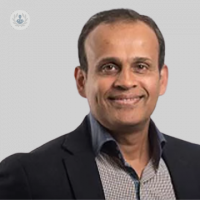ERCP: what are the possible complications?
Written in association with:ERCP (endoscopic retrograde cholangiopancreatography) is a common treatment used by gastroenterologists and general surgeons to diagnose conditions of the liver, bile ducts, pancreas or gallbladder. By using an endoscope alongside real-time radiological imaging, patients are able to receive fast resolution without having to undergo major surgical intervention.

Over 54,000 ERCPs are performed each year in the UK. Complications of the procedure are very rare, although they do exist. Here, leading surgeon Mr Joseph Varghese explains the risks, which are low and how the procedure aids in speedy recovery time.
How does ERCP work?
The surgeon puts an endoscope, which is a long a flexible tube with a camera and light on the end, down the throat to take X-rays of the pancreas, gallbladder and bile ducts. The doctor looks at the pictures on a monitor.
Why would I need an ERCP?
An ERCP is used to determine what is causing particular symptoms such as abdominal pain, jaundice or evidence of an abdominal infection. Imaging may show a blockage in the bile duct, such as a gallstone, or even cancer. If there is a blockage then this can be relieved by an ERCP. The procedure can also work out the size and the stage of a tumour or recognise if there is severe inflammation of the pancreas (acute pancreatitis).
Just how safe is an ERCP?
An ERCP is regarded as a safe procedure but there are some potentially serious complications, which is why it should be done with a strong indication of the need for treatment. The majority of ERCP procedures are performed as an intervention, rather than as a diagnostic test. Although the vast majority of procedures suffer from no complications, roughly 5% of patients undergoing ERCP will incur some form of complication. Of this small percentage only a minute number will suffer from long term complications, however, all patients have the right to a knowledge of the risks and benefits of any procedure prior to consenting.
What are the possible complications?
All patients who are consented for ERCP should be informed of the complications that can arise from the procedure. These may include:
- Mild pain - this should be expected by most patients following the procedure, which is due to the traumatic nature of the intervention. Analgesia given beforehand helps reduce this common complication.
- Mild bleeding – which, for the vast majority of patients, can be managed conservatively.
- Infection – is a common problem but for most patients, it can be managed with antibiotics and causes few long term problems.
- Acute pancreatitis – this is the most common serious complication that occurs in roughly 5% of patients. ERCP related pancreatitis should be managed as a surgical emergency.
- Perforation - this is another rare but serious complication from ERCP, occurring in 0.35% of patients. Age and duration of the procedure increase the risk or perforation and therefore a skilled endoscopist is vital in order to reduce the risk of this life-threatening complication.
- Mortality – this is very rare following ERCP and occurs in only 0.07% of patients. Over 50% of these deaths are due to cardiopulmonary failure which is usually the result of underlying comorbidities (illnesses) and not related to the specific technique of ERCP itself, but rather the stress of the intervention that exerts on the patient.
After being monitored in the clinic or hospital for a few hours, patients can usually go home on the same day of having the procedure. The patient can resume normal everyday activities after they leave the clinic.


